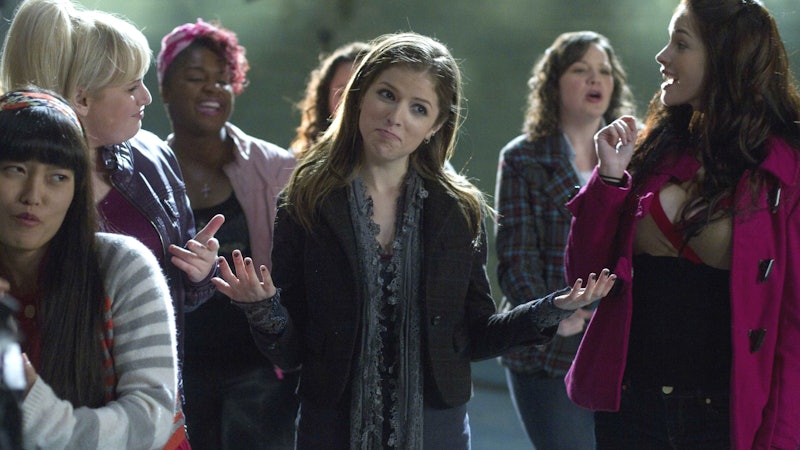
With all the chatter about Pitch Perfect 2 abounding, I'm forced to recall a truth I dare not speak among Pitch Perfect fans: I did not like the original movie. I know, I know. It's aca-awkward. But hear me out.
This isn't some list of plot-holes or cheesy moments drafted by a woman thoroughly sipping on haterade. I got past the tired "rebuilding a team to go to Nationals against all odds" premise and the "edgy girl finds her direction" storyline. I even enjoyed the textbook "heroine leaves the stage to kiss her crush" moment at the very end. In many regards, Pitch Perfect is a cute little movie.
But Pitch Perfect should have been the stuff dreams are made of: Kay Cannon (formerly of the 30 Rock writers room) penned the script, the wonderful Elizabeth Banks co-produced and played a small comedic role, and it stars the delightful Anna Kendrick (who's thankfully escaped the Twilight umbrella) alongside the incomparable Rebel Wilson. The movie was practically a home run before it even hit the park, but upon execution, it was laced with mean-spirited jokes rife with racial and sexual stereotypes.
Yes, the inclusive plot technically goes off without a hitch. Beca (Kendrick) leads us through as the Bellas a capella group undergoes the change from a homogeneous group of "bikini body" singers in flight attendant uniforms to a group of diverse women of all different backgrounds, races, sexual orientations, and body types. They create a unique routine and rock the big finale competition and Beca gets the guy (Skylar Astin). But it's everything leading up to that glorious finale — that I'll admit is so rousing that it temporarily distracts from the film's other issues — that's the problem.
The entire point of the film is the change that takes place in the Bellas, from discriminatory to inclusive, and yet, most of the film seems to hold an antagonistic view of the Bella singers who are responsible for that change. The most common complaints are lobbed at Wilson's "Fat Amy," whose name isn't even Amy — it's Patricia. Throughout the film, she's the brunt of fat jokes — she refuses to run with the rest of the choir, championing jokes about laziness like the famous "horizontal running" line. She's hit with a flying burrito and then exclaims she's going finish her attacker "like a cheesecake."
The film's treatment of the character seems to be screaming "Fat Amy's fat, but look how many great jokes she can make!" as if something needs to compensate for her "different" body. While striving to show a character who's proud of her shape, we find comic relief often stemming from the sheer notion that her body doesn't match her choir mates' and Amy's epic movie-ending solo doesn't change that.
Beyond Fat Amy, the other "different" girls are treated rather poorly throughout the film as well. Lilly, a young Asian woman who's enlisted as one of the Bellas despite her refusal to speak or sing above a whisper, keeping her rather separate from her fellow singers and playing on detrimental stereotype of "quiet Asian women." In fact, Lilly's behavior was called out by the Asian American Press when the film was released in 2012:
It seemed clear to me that Hollywood was perpetuating its longstanding stereotype of Asians, especially Asian women, as meek, submissive and docile. Lilly is made to look weird and she acts funny, perpetuating another stereotype that Asians as a whole are foreign and just can’t mix within other groups or the mainstream.
The other women meant to shake up the Bellas previously non-inclusive group include Cynthia Rose, a woman of color and a lesbian, and Stacie, an overtly sexually liberal young woman. While the entire point of including these characters is to make the point that we're all women, we're all different, and all of our voices matter — which is a wonderful, incredible point — the movie spends almost the entirety of its 112 minutes using Fat Amy, Lilly, Cynthia Rose, and Stacie as joke fodder.
We're supposed to laugh when the sexually liberated Stacie dances too suggestively, as if all women who identify with her take on sex are wanton, undulating machines unable to keep their lips and legs closed during normal conversation — not exactly a fair depiction of sexual liberation, now is it? Similarly, Cynthia Rose's status as a lesbian is used as a source of comedy throughout the movie, including when she finally "admits" she's a lesbian by speaking about her girlfriend in a rather nonchalant manner and Fat Amy feels the need to call her out. "Lesbi-honest," she jokes when Cynthia Rose tells her teammates she needs to get something off her chest.
For the most part, it seems these missteps are meant to represent stereotypes yet to be broken — much like the wildly offensive commentary provided by a capella competition judges played by Banks and John Michael Higgins — but when much of the movie begs us to laugh at them, it hardly seems like a job well done.
So while the news that Banks will be taking the director's chair for Pitch Perfect 2 is an exciting notion considering the great dearth of women directors — especially in the realm of big screen comedies — it comes with a side of reservation. I hope that in its second iteration Pitch Perfect can do right by its incredible cast and crew and their various pedigrees and right the mean-spirited wrongs of its first, beloved outing.
Then, and only then, will I even consider trying to use the word "aca-awesome" without rolling my eyes and in the mean time, you'll have to excuse my unwillingness to do a happy dance at the thought of a second helping of aca-comedy.
Images: Universal Pictures (3)